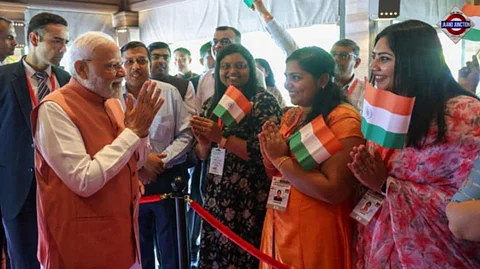

Prime Minister Narendra Modi arrived Maldives on Thursday (July 26) for a two-day state visit that is being seen as crucial for recalibrating India’s relationship with the island nation. Landing at Velana International Airport, PM Modi was warmly received by Maldivian President Mohamed Muizzu, making this the first official state visit hosted by Muizzu since he took office in November 2023.
This high-profile trip comes at a significant time. The Maldives is celebrating its 60th Independence Day and PM Modi has been invited as the Guest of Honour for the national celebrations. It is a strong gesture of friendship amid recent geopolitical tensions.
According to Foreign Secretary Vikram Misri, the visit highlights the strategic depth of India-Maldives relations under the ‘Neighbourhood First’ policy and the broader MAHASAGAR (Mutual and Holistic Advancement for Security and Growth Across Regions) vision.
“Maldives is a close maritime partner and an essential part of our regional diplomacy,” Misri noted earlier this week.
What’s on the Agenda?
The core agenda of Prime Minister Narendra Modi’s two-day visit to the Maldives revolves around deepening strategic ties, reaffirming development partnerships, and resetting diplomatic relations between the two countries. One of the key highlights of the visit is PM Modi’s participation as the Guest of Honour at the Maldives' 60th Independence Day celebrations, a ceremonial role that underscores the symbolic importance of India-Maldives ties. His presence at this historic milestone reflects not only goodwill but also a mutual recognition of the shared regional destiny of the two nations.
On the diplomatic front, PM Modi is scheduled to engage in high-level bilateral talks with Maldivian President Mohamed Muizzu. These include both one-on-one discussions and delegation-level negotiations where the two sides will discuss areas of convergence, such as maritime security, climate resilience, economic growth and regional peace. Given the Maldives' strategic location in the Indian Ocean, both leaders are expected to explore ways to enhance naval cooperation and maritime domain awareness. It is critical for ensuring a free, open and secure Indo-Pacific region.
Another major agenda item is the inauguration of India-assisted development projects across the Maldives. These projects span essential sectors like housing, drinking water supply, sewerage systems, renewable energy, education and healthcare infrastructure. This reflects India’s ongoing commitment to improving the quality of life for Maldivian citizens through development aid. PM Modi’s itinerary also includes the signing of multiple Memorandums of Understanding (MoUs) aimed at expanding cooperation in key areas such as digital connectivity, capacity building, tourism, financial technology, and disaster management. These agreements are expected to boost both economic synergy and institutional partnerships between New Delhi and Malé.
A formal welcome ceremony at Republic Square will feature a guard of honour and a cultural presentation in Modi's honour. In the evening, President Muizzu will host a state banquet, symbolizing a diplomatic thaw and a renewed commitment to forward-looking ties. The tone and optics of these events are significant as they indicate a conscious move towards a reset in bilateral engagement, especially after recent strains due to the Maldives’ growing proximity to China.
Beyond diplomacy and development, the two nations are also expected to focus on promoting people-to-people exchanges, tourism and cultural diplomacy. These discussions align with India’s broader regional framework—namely the MAHASAGAR vision (Mutual and Holistic Advancement for Security and Growth Across Regions) and the ‘Neighbourhood First’ policy highlighting India’s strategic interest in promoting cooperative growth and integration in the Indian Ocean region.
This visit holds strategic significance far beyond ceremonial gestures. In recent months, India-Maldives relations have seen some tension, particularly after President Mohamed Muizzu widely perceived as leaning closer to China took office in late 2023. His early diplomatic posture signaled a potential shift in the Maldives’ traditionally India-first foreign policy. However, PM Modi’s current visit is being seen as a crucial step toward resetting and stabilizing the bilateral relationship with both nations indicating a willingness to re-engage in constructive dialogue.
The trip is not just about strengthening diplomatic ties but also about asserting India’s role as a reliable, long-term partner in the Indian Ocean region an area of growing geopolitical contestation. Given the Maldives' strategic maritime location along vital global shipping lanes, India’s reassertion of influence is seen as critical to ensuring regional security. Modi’s presence in Malé reaffirms India’s commitment under the ‘Neighbourhood First’ policy and the broader MAHASAGAR vision which emphasizes holistic regional security and growth.
The visit also follows closely on the heels of Modi’s high-level diplomatic engagements in the United Kingdom where he signed the India-UK Comprehensive Economic and Trade Agreement (CETA) and held discussions with King Charles III. This indicates a phase of active global diplomacy for India, showcasing its ambition to play a pivotal role in both regional and global arenas.
Additionally, cultural diplomacy is expected to feature prominently in this visit. Both India and the Maldives are likely to explore new avenues for people-to-people connections, educational partnerships and soft power collaboration. India has historically contributed significantly to Maldivian development, aiding sectors like healthcare, infrastructure, education and disaster response. This visit is anticipated to reaffirm and build on that foundation, positioning India as a stable and trustworthy partner amid evolving geopolitical dynamics in the Indo-Pacific region.
